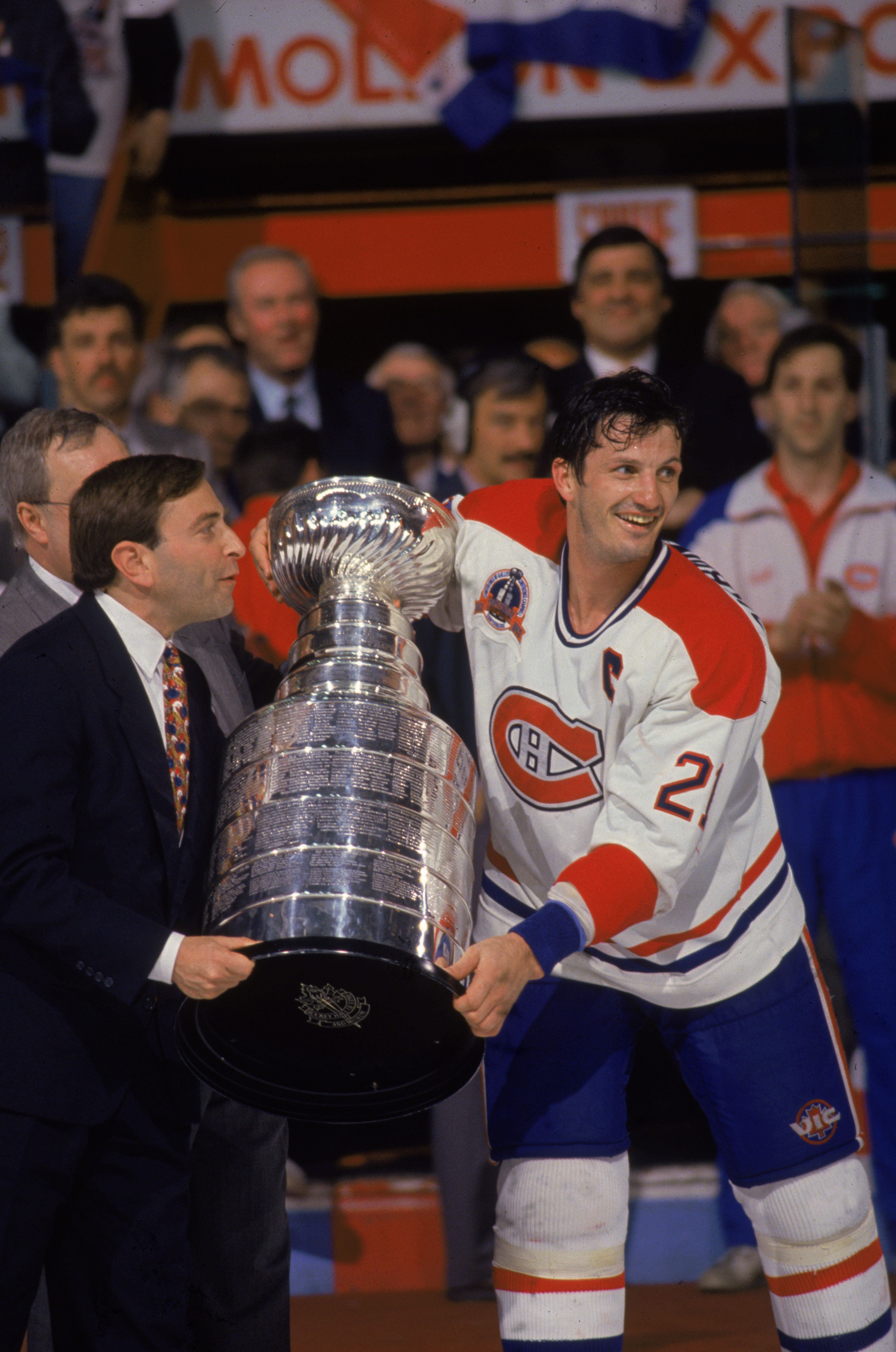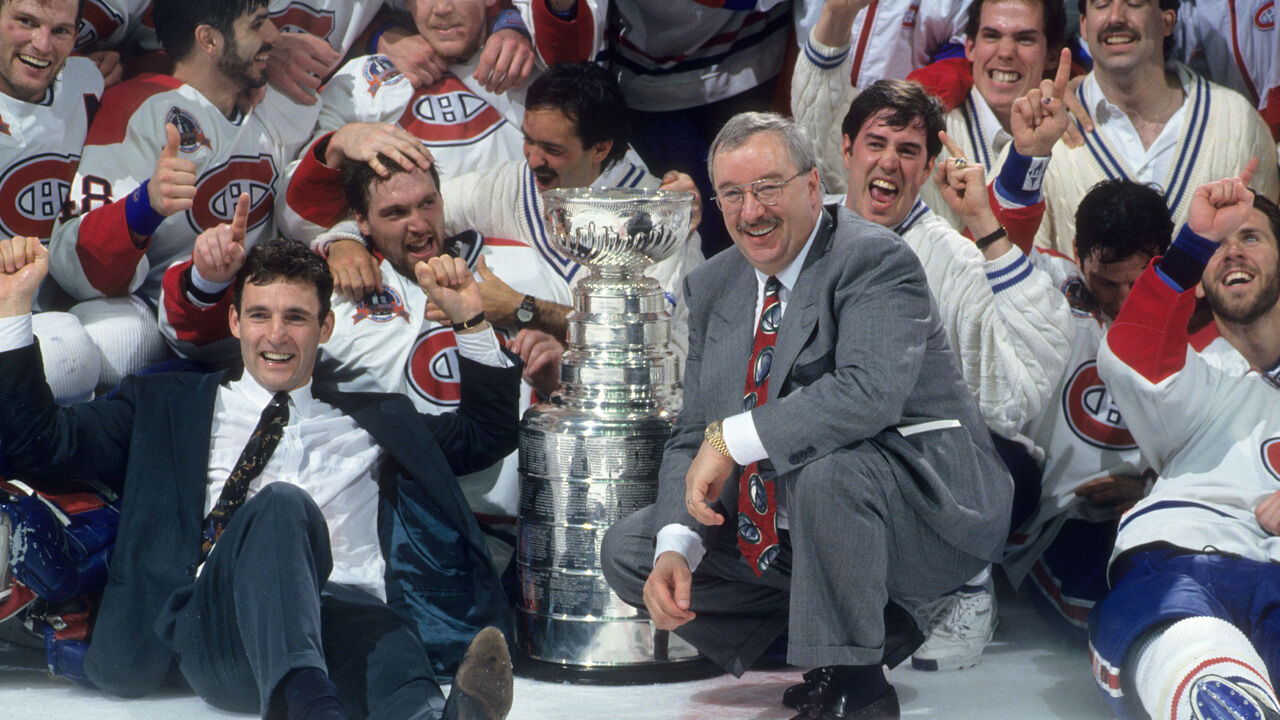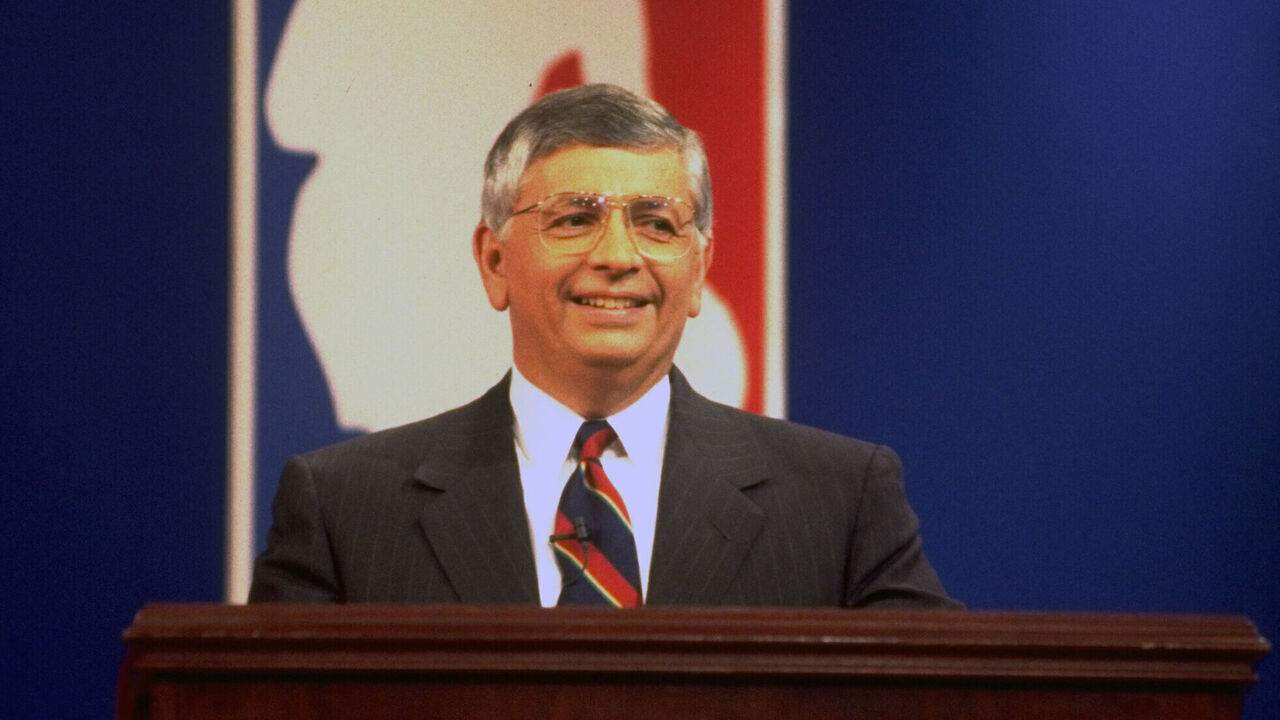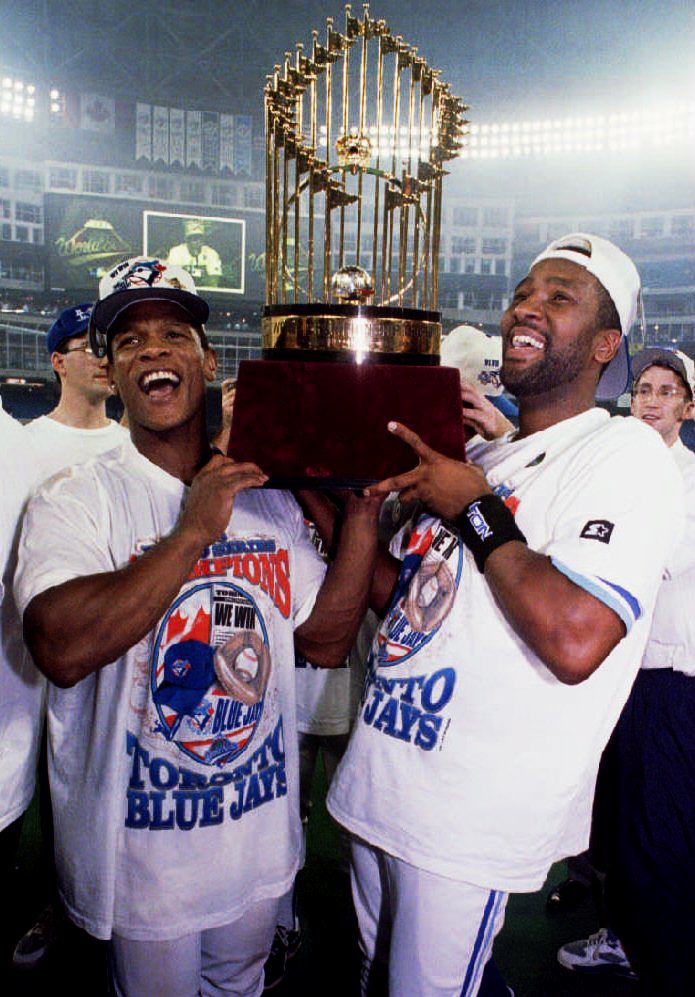Canada's glorious sports year: How the triumphs of 1993 thrilled the nation
Puck on his blade, John LeClair sped down the left wing in the Stanley Cup Final intending to give up the chance to be heroic. A Montreal Canadiens teammate streaked open beside him, ready to one-time a cross-ice feed. The last defenseman back and the opposing goaltender both sprawled to muddle their two-on-one rush.
"I really didn't have a pass to Stephan Lebeau," LeClair told reporters afterward. "I ended up behind the net with everybody out of the net, so I tried to jam it in myself, and I got some help."
The bounces that decide tense NHL games favored the Canadiens in the spring of 1993. Banking the puck off a backchecker, LeClair bagged Montreal's 10th consecutive goal in playoff overtime. It effectively clinched the championship, the famed franchise's 24th and most recent, a triumph tied to that unfathomable streak of clutch production and Patrick Roy's invincibility between the pipes.
Lacking a 100-point dynamo, different Montreal scorers stepped up in huge moments to deliver the last NHL title celebrated by a Canadian fan base. The national Cup drought turns 30 as a new postseason approaches this month.
The puck drops in the Stanley Cup Playoffs as NBA knockout play begins and as day breaks in baseball. Each sport's spotlight beamed on Canada in 1993. The Toronto Raptors were conceptualized and Joe Carter's walk-off bomb crowned the Toronto Blue Jays as repeat World Series champs.
This is the story of Canada's blissful sports year, a boom time that millions of people around the country relished before the bottom fell out.

Magic in Montreal
Dynastic in the 1950s, '60s, and '70s, the Canadiens rocketed to glory in 1986 because of Roy's brilliance as a rookie. Defeats followed to the Calgary Flames in the '89 Cup series and to the Boston Bruins in three straight Adams Division finals. Bench boss Pat Burns resigned, decamping to Toronto to coach the archrival Maple Leafs.
Roy and captain Guy Carbonneau were the lone holdovers in 1992-93 from Montreal's last Cup team. Keen to add weapons, general manager Serge Savard dealt for proven veteran scorers right before training camp started, swinging blockbuster trades to acquire Vincent Damphousse and Brian Bellows. They became two of the Habs' four 30-goal, 80-point producers that season, joining Lebeau and Kirk Muller.
"The Cup was won when Serge made the trades for Damphousse and Bellows," Jacques Demers, Burns' successor as head coach, once opined to Sportsnet. "I really believe as great as Roy was, we needed help offensively."

Owner of the league's sixth-best championship odds in the preseason, Montreal placed fourth in the Prince of Wales Conference following a down year for Roy. The three-time Vezina Trophy recipient slumped to sixth in the voting when his save percentage cratered to .894. Surveyed during the season, 57% of respondents to a Journal de Montreal poll maintained that Savard should trade him.
Hospitalized with chest pains in the midst of a late-year skid, Demers brought his team to a ski resort on the eve of the playoffs to escape media and fan consternation at home. Refreshed, Montreal contained Mats Sundin and Joe Sakic, the Quebec Nordiques' dynamic center tandem, and erased a two-loss deficit in the final installment of the Battle of Quebec.
Roy was beaten on a wraparound in overtime of the playoff opener, but he upstaged Nordiques counterpart Ron Hextall once the series shifted to the Montreal Forum. Damphousse's greasy winner in Game 3 rebounded off a defender's skate through Hextall's legs and was upheld despite the goalie's conniption. Roy gutted out a collarbone injury in Game 5, receiving numbing injections to hold the fort and enable Muller to score in OT.
Montreal benefited from the Buffalo Sabres' stunning sweep of Boston, which Brad May finalized with his "May Day" deke and finish. OT goals by Carbonneau, Gilbert Dionne, and Muller in the Adams final lifted the Canadiens to a string of 4-3 wins. Dionne's goalmouth tip stoked controversy when he tapped his chest twice to signal that he scored. Some replay angles suggested his stick didn't actually graze Patrice Brisebois' point shot.
"But I did score the goal. I know that for sure. I don't care what ESPN's been showing," Dionne said later in the series. "They should stick to baseball and basketball, because they don't really know what's going on on the ice."
The Canadiens unwound at a local hotel as their expected next opponent, the mighty Pittsburgh Penguins, were felled in one of the NHL's great upsets. Mario Lemieux racked up 160 points in 60 games in a season interrupted by treatment for Hodgkin's lymphoma. Rewarded with the Hart, Art Ross, and Bill Masterton Trophies, Lemieux's superlative campaign ended in Game 7 of Round 2 when David Volek struck for the New York Islanders.
"We were in our hotel on the seventh floor, and the Islanders won in overtime, and we all got out of our rooms and high-fived," Lebeau recalled to theScore several years ago. "Between Boston and Buffalo, and between Pittsburgh and the Islanders, I think 99% of the players would have chosen Buffalo and the Islanders."
Spent from battling Lemieux, the Islanders conceded OT tallies to Lebeau and Carbonneau that extended Montreal's win streak in sudden death to seven games.
Roy's .932 save percentage in Round 3 was sterling, but New York bemoaned missed calls, arguing Montreal iced too many men before Carbonneau scored to seal Game 3. Legendary Isles head coach Al Arbour accused the NHL of trying to orchestrate an all-Canadian Cup Final between historic foes.
In the Clarence Campbell Conference, memorable OT goals from Nikolai Borschevsky, Doug Gilmour, and Glenn Anderson powered Burns' Leafs to the brink of the final. Toronto was one win from bouncing the Los Angeles Kings when Wayne Gretzky, debunking Arbour's conspiracy theory, notoriously wasn't penalized for high-sticking Gilmour in crunch time of Game 6. Gretzky's OT tap-in and hat trick on the road in Game 7 helped L.A. advance.
"It was agony for Leafs fans … They felt it was their time," Kerry Fraser, the referee of Game 6, acknowledged in a 2016 essay for The Players' Tribune. "If I had one opportunity to turn back the hands of time for a 'do over' it would be to catch that high-stick."
Gretzky scored on Roy and dished three assists to open the Cup Final, prompting Carbonneau to act. Swearing that a persistent knee injury wasn't bothering him, the tenacious checker asked Demers to let him shadow the Great One, who managed a modest three helpers the rest of the way.
Down by a goal with two minutes left in Game 2, Carbonneau convinced Demers to risk a delay-of-game penalty, requesting from Fraser the measurement that confirmed L.A. defenseman Marty McSorley's stick curve was illegal. Habs blue-liner Eric Desjardins scored on the ensuing six-on-four, then blasted a snapshot through Kelly Hrudey in the Kings net 51 seconds into overtime, completing a hat trick.
"These are mistakes that those longtime Stanley Cup party animals, Les Canadiens, chew up and wash down with great gulps of champagne," E.M. Swift wrote about the McSorley incident in Sports Illustrated's recap of the series.
When Games 3 and 4 required extra frames, LeClair ended both, roofing a rebound on his third thwack at a loose puck before he converted the two-on-one rush with Lebeau. Earlier in Game 4, Roy was captured on camera winking at Tomas Sandstrom after he robbed the Kings forward by the crease. The overtime victory was Montreal's 10th in the postseason, the NHL record by a wide margin, per Stathead.
"It's possibly a record that will never be beaten," Demers told reporters postgame.
Game 5 enthroned the Habs as champions and triggered a riot in downtown Montreal. The Kings barely challenged Roy, mustering a season-low 19 shots on net, zero from Gretzky in a pointless effort. Muller netted the Cup winner by shoveling the puck past Hrudey in a scramble early in the second period.
Montreal wasn't a Cup favorite at the outset of the playoffs, Bob Cole intoned on the CBC broadcast on June 9, 1993.
"But (team president) Ronald Corey got Serge Savard, he hired Jacques Demers, and all together they worked a young team to the top," Cole said as the crowd roared in the waning seconds of the finale. "And now a 24th Stanley Cup banner will hang from the rafters of the famous Forum."
Toronto's time to shine
Toronto never forgot the high-stick that bloodied Gilmour, but the local sports scene rebounded from that blow and expanded. Eager to internationalize under the late commissioner David Stern, the NBA in the summer of 1993 solicited bids to own the new franchise that became the Raptors.

The bidders included Magic Johnson, who explained with characteristic earnestness that he was ready to face Canadian winters: "A little rain, snow, or sleet won't bother me, because basketball is played indoors." Construction magnate Larry Tanenbaum, the Raptors' current governor, submitted a rival bid after vying unsuccessfully to buy and relocate the Denver Nuggets and the San Antonio Spurs. He proposed naming the team the Toronto Thunder.
Prevailing over Tanenbaum in an upset was businessman John Bitove Jr., whose restaurateur family owned the concession rights at Toronto's SkyDome and Pearson International Airport. A college acquaintance of Isiah Thomas, whom he hired to run the Raptors' front office, Bitove had helped attract the FIBA World Cup to Toronto and possessed every issue of Sports Illustrated produced since 1969, the Toronto Star noted when his bid was chosen.
The NBA tapped Bitove's group as the winner in September 1993 on his 33rd birthday. Supporters sang "Happy Birthday" before digging into a celebratory meal as Bitove smiled and buried his head in his palm. He deflected credit for the triumph to his ownership partners.
"I was just the quarterback, the point guard, the playmaker," Bitove said, per the Star.
The Bitove syndicate paid $125 million, a record sum, to join the NBA as Michael Jordan retired for the first time. More than 25,000 Torontonians flocked to SkyDome a year earlier to see Jordan shake off rust in a preseason game. Jordan stepped away at the peak of his powers in October '93, the day after he patronized the Chicago White Sox's playoff opener, bouncing the ceremonial first pitch in the right batter's box.
The Blue Jays saw that happen live. The reigning World Series winner, Toronto secured in 1993 its fourth American League East title in five seasons, setting up the ALCS brush with Chicago that kick-started the club's championship defense.
Five All-Stars batted consecutively at the top of Jays manager Cito Gaston's order. Toronto's fearsome WAMCO quintet - Devon White, Roberto Alomar, Paul Molitor, Joe Carter, and John Olerud - powered the Blue Jays to third place in MLB scoring. Olerud hit .363 in 1993, edging Molitor and Alomar atop the AL batting leaderboard. Fresh off catching the decisive out of the '92 Fall Classic, Carter slugged a team-best 33 home runs.
Deadlocked for the division lead as late as Sept. 9, the Blue Jays rattled off nine straight victories and 17 in 21 to eclipse the New York Yankees in the AL East by seven games. Toronto closer Duane Ward's 45 saves in a 95-win season elevated him to fifth in the AL Cy Young voting.
The Jays rocked the winner of the award, White Sox ace Jack McDowell, for 18 hits over his two starts in the ALCS. McDowell sailed a pickoff attempt into center field in Game 5, permitting midseason acquisition Rickey Henderson to score the opening run. The day before Game 6 was Canadian Thanksgiving, so Dave Stewart, Toronto's scheduled starter, served turkey dinners at a Salvation Army center downtown before he hopped a late flight to Chicago.
"I met Stewart's mother last week at a restaurant," White Sox designated hitter Bo Jackson told The New York Times ahead of Game 6. "I told her the next time we face her son, we're going to kick the beans out of him. I can't lie to his mother."
The prediction didn't take. Stewart limited Chicago to four hits over 7 1/3 innings and Ward induced the final five outs, the last of which Carter snared in right field to retain the AL pennant.
"For some reason, the ball finds my glove for the last out, again," Carter told Sportsnet years later. "Those things just seem to happen to me."
Toronto proceeded to top the Philadelphia Phillies in an epic World Series. Phillies outfielder Lenny Dykstra stroked four homers in defeat, but the Blue Jays outscored the National League champs 45-36 over six barn burners, thanks largely to Alomar and Molitor combining to hit .469.
The matchup teemed with rich storylines. Toronto tagged Phillies ace Curt Schilling for seven runs in the opener, then lost narrowly in Game 2 despite Schilling's dread about the outcome.
Nervous in the dugout, Schilling covered his head with a towel when erratic Phillies closer Mitch Williams took the mound, angering Williams behind the scenes. Before his next start, Schilling pinned a neon green button to his cap that proclaimed, "I survived watching Mitch pitch in the 1993 World Series."
Braving the rain, more than 62,000 fans packed Veterans Stadium in Philadelphia for back-to-back slugfests that lasted past midnight. Gaston benched Olerud in Game 3 so that Molitor, unable to DH in the NL park, could man first base. Molitor tripled and homered, but also urged the commissioner to change the DH rule: "Mr. (Bud) Selig, if you're listening, it just doesn't make a lot of sense."
Game 4 was soggy and thrilling. Jays pitcher Todd Stottlemyre cut his chin in a baserunning misadventure, but Toronto collected 17 of the night's 31 hits and erased a five-run deficit in the eighth inning to win 15-14.
"Two touchdowns is usually safe," Stewart remarked to Sports Illustrated.
Schilling blanked the Jays on 147 pitches in Game 5, ensuring the clincher would be played at SkyDome in Toronto. On Oct. 23, Dykstra's shot to the second deck chased Stewart in the seventh inning of Game 6, sparking Philadelphia to a 6-5 lead that Williams would fail to protect.
Molitor singled Henderson to second base with one out in the ninth right before Carter stepped to the plate. On the fifth pitch he saw, Williams hung a slider down and in that Carter belted over the left-field wall into the Toronto bullpen. Fireworks detonated, jubilant fans and his teammates stormed the turf, and Carter's helmet flew off as he jumped rounding the bases.
Interviewed on TSN as a million revelers filled the streets outside the dome, Carter said he lost the ball in the lights before he realized it cleared the fence. He was living every ballplayer’s childhood fantasy.
"Every dream as a kid that you have, it's always the bottom of the ninth. It's the last game of the World Series. You hit the game-winning home run," Carter said. "I can look back and say for one moment, I did that."
Elsewhere, backup outfielder Rob Butler poured Budweiser onto the coiffed hair of CTV reporter Rod Black. The party raged in the clubhouse as Butler, the lone homegrown Blue Jay, spoke through the camera to family and friends in Newfoundland: “I love everybody in Butlerville. I love everybody in Toronto. I love everybody in Canada!"

The aftermath
Pat Gillick, architect of the Blue Jays' championship lineups, resigned as GM in the afterglow of the Carter bash and wasn't around for the club's imminent collapse. A losing team in the strike-shortened 1994 season, Toronto finished 30 games back of the AL East lead in '95, then played mediocre baseball for the next two decades.
The Montreal Expos' fate was worse. Losers of the "Blue Monday" NLCS heartbreaker in their only taste of the postseason, the Expos infamously owned the best record in the majors in '94 when the strike began and ultimately nixed the World Series. Stars of that team - Moises Alou, Pedro Martinez, Larry Walker - gradually signed elsewhere or were traded. The Expos plunged in the standings and moved to Washington in 2005.
Around the time Bitove named his team the Raptors, unveiling pro basketball's "newest, freshest, and hungriest look," the NBA doubled down on expanding to Canada. The Raptors and Vancouver Grizzlies both debuted in the league in 1995-96. Dealing for Vince Carter in 1998 put Toronto on the NBA map, but the Grizzlies posted a .220 win percentage over six seasons, alienating their original fan base before they uprooted to Memphis.
All the while, Canada's Stanley Cup drought persisted. Canadian NHL teams have combined to make 93 playoff appearances since Montreal reigned in '93. They've won 63 series without raising the chalice.
Five Canadian franchises surged to the final in that span, but their collective record in those series is 0-6. In 2004, officials didn't see Martin Gelinas' would-be Cup winner for Calgary cross the goal line. Canada's most recent Game 7 loss incited rioting in Vancouver.
Expansion and the establishment of the salary cap created parity in the NHL, empowering 14 American clubs to split the last 28 titles. Canada's dry spell became historically interminable. The second-longest national Cup drought lasted seven years, between when the Montreal Maroons prevailed in 1935 and the Leafs won in 1942.
The wait could end in June or continue indefinitely. The Oilers and Leafs would stage a stirring Cup Final if both teams ever got that far. The current iterations of the Flames and Jets might already have peaked. Committing to a rebuild like the Senators and Canadiens did could eventually heighten the Canucks' ceiling.
The Raptors bottled magic in the spring of 2019 to hoist the Larry O'Brien Trophy before Kawhi Leonard departed. The promise the Blue Jays have flashed since Vladimir Guerrero Jr. and Bo Bichette broke onto the scene has yet to translate to playoff victories. They chase what Muller savored 30 years ago, when he described the meaning of the Cup triumph to the Montreal Gazette's Red Fisher.
"Somewhere down the road - next week, next year, 20 years from now - somebody will look at you and tell you you’re a winner," Muller said in 1993. "It’s looking in the mirror and knowing you’re a winner."
Nick Faris is a features writer at theScore.
HEADLINES
- Embiid out at least 3 games with strained right oblique
- Jokic calls out Dort for 'unnecessary' foul after chippy contest
- Miller scores 26 points as Hornets beat Trail Blazers for 4th straight win
- NBA's 65-game rule ruined MVP race, OKC's depth shines, Jokic rolls
- Want to stop NBA tanking? Get rid of the draft